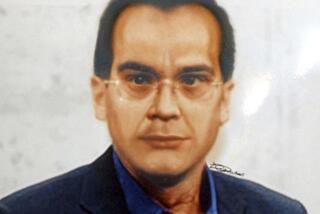Senator Cites Possible Mengele Drug Link : Nazi May Have Financed Self by Selling Cocaine, D’Amato Testifies
- Share via
WASHINGTON — Dr. Josef Mengele, the most notorious Nazi war criminal still at large, may have financed his life and travels as a fugitive in South America by trafficking heavily in cocaine, Sen. Alfonse M. D’Amato (R-N.Y.) testified Tuesday at the first Senate hearing on the Mengele case.
Still-confidential U.S. government documents on Mengele, who is being sought by the United States and other nations, suggest that his drug activities came to light in Paraguay and Brazil in 1972 and 1979, according to D’Amato.
‘Large Sums of Money’
Cables and other documents indicate that Mengele “had a network available to him in raising large sums of money” and that “high officials (in South America) gave him protection,” D’Amato told a Senate Judiciary subcommittee. He refused to tell Sen. Arlen Specter (R-Pa.), the subcommittee chairman, the source of the documents but promised: “We are hopeful they can be made public in a few days.”
Robert Feldkamp, a spokesman for the U.S. Drug Enforcement Administration, said later: “We do not know what Sen. D’Amato is referring to. We have no information along those lines.”
D’Amato repeated statements he had made on a television interview show Sunday that Mengele apparently left his sanctuary in Paraguay in 1980, because some associates reported receiving Christmas cards and letters from him from Portugal that year.
Interest Rekindled
Interest in Mengele, known as the “Angel of Death” of the Auschwitz concentration camp for his murderous medical experiments on Jewish women and children, was rekindled last month when evidence arose showing that he might have been in the custody of U.S. Army occupation forces after World War II.
The evidence was contained in letters and other declassified U.S. government documents obtained by the Los Angeles-based Simon Wiesenthal Center for Holocaust Studies. Atty. Gen. William French Smith subsequently ordered a full investigation to find Mengele, if he is still alive, and to determine whether U.S. authorities had any postwar contact with him.
Lt. Gen. William E. Odom, assistant chief of staff for Army intelligence, told the subcommittee that military records he has seen “give no indication that Dr. Mengele was the subject of Army intelligence interest.”
However, when Odom testified that he lacked certain information because the principal investigation was being conducted by the Justice Department, Specter told him sternly: “You have the duty to look into this and obtain answers. It is time the Army gave some priority to the matter of Josef Mengele.”
Joined in Lawsuit
D’Amato, who has joined in a Freedom of Information Act lawsuit that the Wiesenthal center filed against the Army, said two former U.S. servicemen now have come forward to say that they saw a prisoner identified as Mengele in the custody of the U.S. Army in Germany in 1945.
Rabbi Marvin Hier, dean of the Wiesenthal center, testified that he has evidence that Mengele, who would be 73, was alive and well in Paraguay as recently as 1982, where he “had taken up the hobby of collecting bees.”
More to Read
Sign up for Essential California
The most important California stories and recommendations in your inbox every morning.
You may occasionally receive promotional content from the Los Angeles Times.













